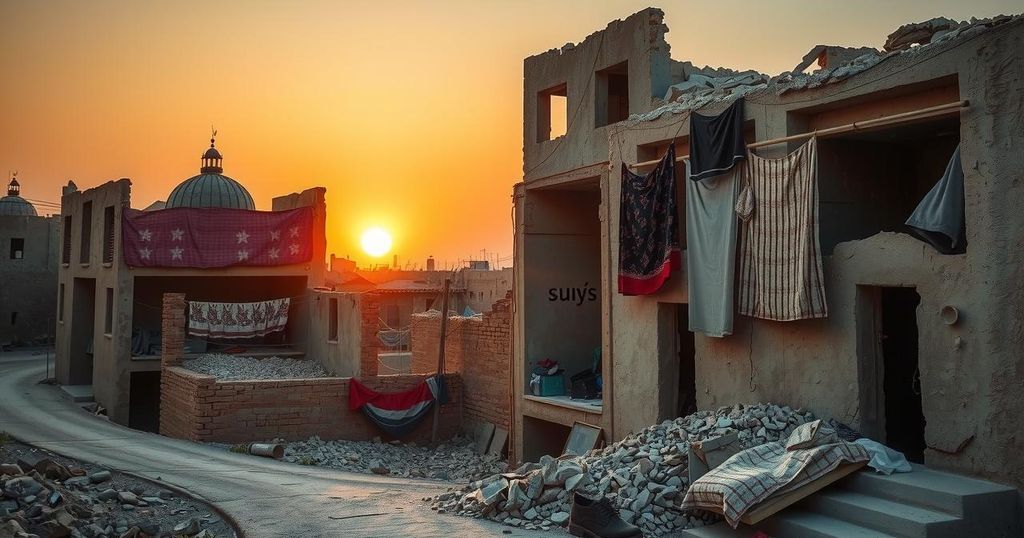Syrians Experience Bittersweet Ramadan Amidst Return and Remembrance
Many returning Syrians celebrate their first Ramadan back home amidst feelings of nostalgia, relief, and loss after years of exile. They grapple with profound changes in their hometowns, reflecting on absent loved ones and destroyed homes while attempting to revive old traditions. The ongoing need for community rebuilding and support remains paramount, as these individuals aim to navigate a new reality following years of conflict.
Zuhair Sulaiman has returned to his hometown of Daraya, Syria, after years of living in exile. He and his wife eagerly await the call to prayer to break their fast during Ramadan, a significant moment as this marks the first time in over a decade that they observe the holy month in their homeland. Despite the joy of returning home, Sulaiman expresses a sense of loss as he reflects on the changes that have occurred since they left, emphasizing that something is undeniably absent from their experience.
The poignant situation in Daraya, a site of fierce conflict during the Syrian civil war, is apparent as the city continues its struggle to recover. Numerous families are rebuilding their homes and lives, but many still face the harsh realities of destruction and loss. Images of damaged buildings and individuals clearing rubble underscore the devastation left by years of fighting after the uprising against President Bashar Assad.
Mariam Aabour, another returnee from Lebanon, expresses mixed emotions upon her return. While she felt joy at the ousting of Assad, the experience is tinged with sorrow as she mourns her father’s recent passing and the absence of family members who could not join her. The bittersweet nature of her first Ramadan back home highlights the deep personal losses accompanied by the festive spirit of the holy month.
Returning Syrians have begun to reconnect with old traditions, as Aabour mentioned that although she missed the presence of her deceased father and son during iftar, she finds comfort in the communal aspects of the holiday. The call to prayer resonates in her heart, marking a return to a familiarity she once yearned for while living in Lebanon.
Despite the profound changes in their surroundings, many individuals maintain a sense of belonging. Faraj al-Mashash, Aabour’s husband, acknowledges the difficulties yet expresses contentment in being home, describing Daraya as a place he holds dear, despite its desolation. The emotional return to a ravaged homeland is often echoed by others as they navigate the ongoing reconstruction amid memories of a life interrupted.
As more than 370,000 Syrians return to their homeland, they confront longstanding challenges ranging from unexploded mines to housing shortages. According to Celine Schmitt, spokesperson for the UNHCR in Syria, the organization is addressing these issues through educational sessions about mine safety and legal assistance for displaced families needing documentation. The resilience of these returning individuals is evident, as many aim to rebuild their lives and families despite the overwhelming odds.
The desire for dignified living conditions is echoed across the broader Syrian population, where many still grapple with the consequences of conflict. Umaya Moussa symbolizes this hope as she recounts her traumatic journey back to Syria with her children, underlining the importance of reuniting with lost traditions and family during Ramadan. The absence of loved ones during these gatherings profoundly affects many, leaving an undeniable void that cannot be filled.
Saeed Kamel, another returnee, visits his mother’s grave this Ramadan, sharing his heartache over lost family members and the difficulty of adjusting to a life filled with uncertainty. While he reflects on happier times pre-war, Kamel expresses optimism for future generations, hoping they might enjoy a better life in a liberated Syria. The memories of Ramadan past resonate strongly within the community, reminding returnees of what has been irrevocably changed.
The return of many Syrians to their homeland amid Ramadan highlights a complex blend of nostalgia, relief, and sorrow. Individuals and families grapple with the losses of loved ones and homes, while also attempting to revive traditions that once brought them joy. The ongoing reconstruction of their communities reflects their resilience, as they seek to rebuild their lives in the aftermath of a devastating conflict. Amidst these struggles, the hope for a better future persists, motivating many to strive for dignity and normalcy in a country still in transition.
Original Source: apnews.com




Post Comment